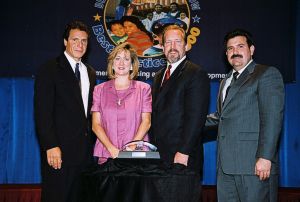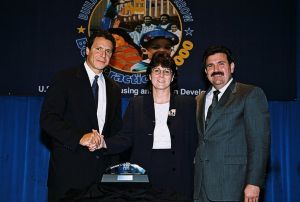 |
2000 Best Practice Awards
Best of the Best Winner: Delaware
Best Practice: Wilmington Housing Project
Partnership Develops Housing Program for
First-Time Homebuyers
Wilmington, Delaware. Many of the residents of Wilmington are sleeping a little
better now—secure in homes of their own. Some of these homes were once
vacant and abandoned; others just needed a little attention. Thanks to the
involvement of several people, their walls are once again vibrant with the
sounds of life. The Wilmington Housing Partnership, a consortium of
financial, corporate and governmental institutions, has breathed life into
these neglected residences once again.
Wilmington’s challenges are not unlike
those of other U.S. cities. In 1990, 31 percent of |

Jane Vincent/Bob Weer (c) receiving Best of
the Best award from Secretary Cuomo (l) and Deputy Secretary Ramirez (r) |
Wilmington’s 28,500 households faced
housing problems, ranging from affordability to overcrowding, with low-income
house-holds facing the most acute housing challenges. The city felt that
it had to take immediate action to address these problems by developing
programs to increase homeownership, make housing more affordable to all
segments of the population, and provide assistance to elderly homeowners
with renovation efforts.
The partnership started because its founders
saw a need within a city and came together to address it. The Wilmington
Housing Partnership is a shining example of how governmental, financial,
nonprofit organizations, and private industry can work together to improve
housing in one city.
Among the Wilmington Housing Partnership’s
accomplishments:
- Offered down payment and settlement assistance
to 210 first-time home buyers
- Generated over $4 million in private financial
support for the project
- Provided $1.2 million to private and non-profit
developers for construction of 231 homes
- Developed a tax waiver program to assist
37 first-time homebuyers
- Held a city-wide auction to assist low-
and moderate-income buyers in purchasing homes
- Rehabilitated more than 400 owner-occupied
housing units to comply with city code
- Provided emergency home repair assistance
to 28 senior citizens
- Rehabilitated 19 owner occupied and 11 rental
units through state programs.
Contact: James Sills, Phone: (302) 571- 4100
Tracking Number: 951
Winning Category: Program (Community Planning and Development) |
Best Practice: Delaware Rural Housing Consortium
Delaware Builds Low-Income Housing in Rural
Areas
| Dover, Delaware.
Seven nonprofit rural housing organizations have come together as The Delaware
Rural Housing Consortium to accomplish collectively what they could not
accomplish alone. Rural nonprofit developers, and the people they serve,
are often isolated and have little access to resources thus reducing their
effectiveness in addressing the housing needs of the homeless, the very
low income and special needs populations. Rather than compete for scarce
resources, consortium members set out to form a state-of-the-art collaborative
to coordinate housing development activities to better serve those in need.
The seven |

Karen Speakman (c) receiving Best of the Best
award from Secretary Cuomo (l) and Deputy Secretary Ramirez (r) |
organizations comprising the consortium share
grant writing, government contacts, training and education and work together
to creatively solve problems.
While consortium members could have focused
their efforts on a variety of areas, members have chosen to serve those
with the greatest housing needs and the least chance for improved housing.
In Kent and Sussex counties in Delaware, circumstances for rural nonprofit
developers and the communities they serve are dire. Most households served
by the consortium are very low-income, living between 50 percent-80 percent
below the area’s median income. Modest paying jobs in the fast food,
service and poultry processing sectors dominate rural Delaware. Most smaller
communities and rural county governments have difficulties funding public
utilities, yet these systems are necessary for affordable housing. Few national
foundations are geared toward rural development, and fewer corporations,
banks and large employers exist in rural Delaware resulting in less access
to corporate charity.
Yet with the odds against them, the consortium’s
efforts have resulted in increased awareness of rural housing needs and
successes through: 1) its video, “More Than Bricks and Mortar;”
2) its report, “Ten Ways to Increase the Supply of Affordable Rental
Housing in Rural Delaware;” 3) a rural housing summit held last fall;
4) the Rental Housing Investment Certificate concept to reduce rent for
lower income households and 5) the 3-Year Housing Development Plan which
will have a dramatic impact on 750 lower income house-holds in rural Delaware
through the building of new housing units and assistance to renters and
first-time homebuyers.
Critical to its sustainability, the consortium
has also gained support from the foundation and banking communities. The
Longwood Foundation helped provide initial funding to launch the consortium.
Providers of affordable housing such as the USDA, HUD, the Delaware State
Housing Authority and the Delaware Community Investment Corporation have
provided financing for the 11 housing projects within the Three Year Housing
Development Plan. Delaware banks such as Chase Manhattan, Greenwood Trust
Company and the Wilmington Trust Company are supporting the consortium through
corporate contributions and lending of construction financing to projects
in the Development Plan. The banking community is also helping to structure
the Rental Housing Investment Certificate.
With its successes in increasing awareness
about affordable housing combined with the support of the banking and foundation
communities, the consortium has proven that is possible to accomplish collectively
what individually could not be done alone.
Contact: Joe Myer, Phone: (302) 678-9400
Tracking Number: 1048
Winning Category: Geographic |
Return to Best
Practices 2000 Best of the Best Winners
Content Archived: April 20, 2011 |